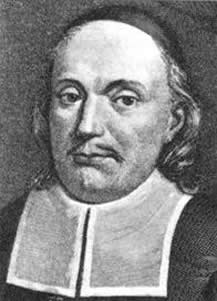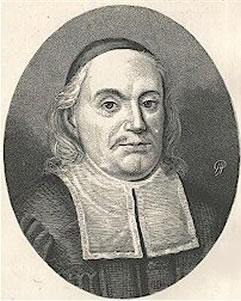Paul Gerhardt
“1607 – 1676”

Paul Gerhardt (1607 – 1676)

Paul Gerhardt (1607 – 1676)
→ O maior poeta luterano de todos os tempos é, sem dúvida, Paul Gerhardt, um homem que sentiu na própria carne os horrores da guerra dos trinta anos. (Sobre a Guerra dos Trinta anos veja em Musica e Igreja). A guerra dos Trinta Anos havia terminou em 1648. No entanto, a epidemia, a fome, a desnutrição, a pobreza, e enfim, a morte, foram conseqüências que continuaram por muitos anos. Paul Gerhardt viveu neste contexto. Gerhardt nasceu em 12 de Março de 1607, na Cidade de Grafenhaynichen, Alemanha (Germany).
Enquanto a guerra desolava a Alemanha, Paul Gerhardt concluía seus estudos de teologia na universidade de Wittenberg. A dura realidade da guerra o impediu de assumir logo o pastorado, o que lhe dificultou mais ainda ganhar o pão para sobrevivência. Mas foi nesta triste situação que começou a brotar o seu dom da poesia. Já em 1647 o músico Johann Crüger publicou o hinário “Praxis Pietatis Melica” (Música de Prática Piedosa), no qual já continham 18 hinos de Paul Gerhardt, dos quais o povo se agradou muito. Seu primeiro ministério assumiu em 1651 em Mittelwalde. Em 1655 casou com Anna Maria Berthold, cujo primeiro fruto deste casamento, uma filha, morreu na infância. Em 1557 recebeu chamado para Berlim. Além de renomado poeta, Paul é também reconhecido como um grande pregador. Seus sermões atraíam muita gente aos cultos.
Além de todo o dilema da guerra, no qual viveu, por volta de 1662, começaram para ele os anos de maior luta. O eleitor Friederich Wilhelm da Prussia, aderiu ao calvinismo e forçou uma união entre luteranos e calvinistas. A tentativa de chegar a um acordo não aconteceu. Paul Gerhadt foi um dos braços fortes dos teólogos luteranos na resistência. Foi, principalmente, através dos hinos, que Paul Gerhardt manteve a posição doutrinária luterana contra o calvinismo. Dois anos após, o eleitor Friederich, vendo seu plano frustrado, decretou que, os pregadores tanto luteranos como calvinistas pregassem a mesma doutrina, obviamente calvinista. Paul Gerhardt, fiel aos princípios da doutrina luterana se recusou a obedecer ao decreto e por isso, foi forçado a abandonar o ministério e inclusive foi proibido de dar atendimento pastoral em sua própria casa.
Em meio a este dilema, Gerhardt ainda suportou a morte de mais um filho e em seguida a morte da esposa, ficando sozinho com um filho de seis anos. Em vida perdeu quatro dos cinco filhos que tinha. Enquanto a sua esposa estava gravemente enferma, ele leu para ela as palavras do Salmos 37:5 “Entrega o teu caminho ao Senhor, confia nele, e o mais ele fará”. Essas palavras o inspiraram a escrever o hino “Entrega o teu caminho” (Hinário Luterano, 424). Em 1668 foi chamado para Lübben an der Spree, Spreewald, Alemanha, Cidade onde faleceu em 27 de Maio de 1676.
Paul Gerhardt escreveu 123 hinos. Na maioria são extensos com várias estrofes. Sua poesia é de um talento incontestável. A linguagem é simples, porém, os conteúdos são profundos. Sua experiência de vida e seu exemplo de fé estão fortemente marcados neles. O conteúdo deles está firmado na doutrina da justificação pela fé e expressam uma convicção cristã muito sincera e uma teologia cristocêntrica. Milhões de pessoas foram consoladas através dos seus hinos.
→The greatest Lutheran poet of all time is undoubtedly Paul Gerhardt, a man who felt in his own flesh the horrors of the thirty-year war. (About the Thirty Years’ War see Music and Church). The Thirty Years’ War had ended in 1648. However, the epidemic, hunger, malnutrition, poverty, and finally, death, were consequences that continued for many years. Paul Gerhardt lived in this context. Gerhardt was born on March 12, 1607, in the City of Grafenhaynichen, Germany (Germany).
While the war was desolating Germany, Paul Gerhardt was completing his theological studies at the University of Wittenberg. The harsh reality of the war prevented him from taking over the pastorate immediately, which made it even more difficult to earn his bread for survival. But it was in this sad situation that his gift of poetry began to emerge. In 1647, the musician Johann Crüger published the hymnbook “Praxis Pietatis Melica” (Music of Pious Practice), which already contained 18 hymns by Paul Gerhardt, which the people were very pleased with. His first ministry took over in 1651 at Mittelwalde. In 1655 he married Anna Maria Berthold, whose first fruit of this marriage, a daughter, died in childhood. In 1557 he received a call to Berlin. In addition to being a renowned poet, Paul is also recognized as a great preacher. His sermons attracted many people to worship.
In addition to all the dilemma of war, in which he lived, around 1662, the years of greater struggle began for him. Elector Friederich Wilhelm of Prussia, adhered to Calvinism and forced a union between Lutherans and Calvinists. The attempt to reach an agreement did not happen. Paul Gerhadt was one of the strongest arms of the Lutheran theologians in the resistance. It was mainly through the hymns that Paul Gerhardt maintained the Lutheran doctrinal position against Calvinism. Two years later, voter Friederich, seeing his plan frustrated, decreed that both Lutheran and Calvinist preachers would preach the same doctrine, obviously Calvinist. Paul Gerhardt, faithful to the principles of Lutheran doctrine, refused to obey the decree and was therefore forced to abandon the ministry and was even forbidden to give pastoral care in his own home.
In the midst of this dilemma, Gerhardt still endured the death of one more child and then the death of his wife, being alone with a six-year-old son. In life, he lost four of the five children he had. While his wife was seriously ill, he read to her the words of Psalm 37: 5 “Commit your way to the Lord, trust him, and the more he will do”. These words inspired him to write the hymn “Give up your way” (Lutheran Hinário, 424). In 1668 he was called to Lübben an der Spree, Spreewald, Germany, where he died on May 27, 1676.
Paul Gerhardt wrote 123 hymns. Most are extensive with several stanzas. His poetry is an undeniable talent. The language is simple, however, the contents are profound. Their life experience and their example of faith are strongly marked in them. Their content is based on the doctrine of justification by faith and they express a very sincere Christian conviction and Christocentric theology. Millions of people have been comforted through their hymns.
Maria Beatriz da Silva Borges Salomão Luiz Ginsburg

Mas ele foi ferido por causa das nossas transgressões, e esmagado por causa das nossas iniqüidades; o castigo que nos traz a paz estava sobre ele, e pelas suas pisaduras fomos sarados. Todos nós andávamos desgarrados como ovelhas, cada um se desviava pelo seu caminho; mas o Senhor fez cair sobre ele a iniqüidade de todos nós. Ele foi oprimido e afligido, mas não abriu a boca; como um cordeiro que é levado ao matadouro, e como a ovelha que é muda perante os seus tosquiadores, assim ele não abriu a boca. Pela opressão e pelo juízo foi arrebatado; e quem dentre os da sua geração considerou que ele fora cortado da terra dos viventes, ferido por causa da transgressão do meu povo?
